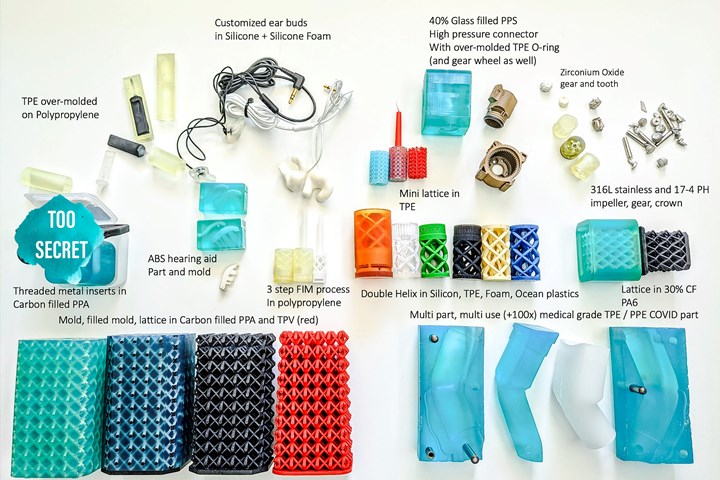3D-Printed Tooling Workflow Achieves Complex Part Prototyping
Addifab freeform injection molding (FIM) simplifies design and delivery of injection-molded test parts through scaled production of 3D-printed mold cores and cavities compatible with any molding feedstock.
Share
Read Next
The prototyping of complex injection-molded components is a long-standing challenge since they require complex tooling, which is expensive and time-consuming to design and produce. Now, Addifab has plugged 3D printing speed and design freedom directly into tool designer workflow, to enable a rewriting of the pilot tooling playbook.
Soluble, 3D-printed injection mold cores and cavities is one of the essential innovations behind the novel Addifab freeform injection molding (FIM). According to the company, these cores and cavities are based on a new class of proprietary 3D printing resins that combine high strength and thermal stability. Moreover, they enable molds to be designed and produced in hours instead of weeks, to provide a high-speed, easy-to-use alternative to conventional metal tool elements for the production of first injection-molded test parts.
The injection molding industry is characterized by a wide selection of materials, and Addifab FIM is reported to be compatible with most. Addifab says customers have used FIM to prototype parts in materials ranging from soft silicone rubbers through PEEK and PAEK, to very hard ceramics and metals, in part sizes spanning from the sub-millimeter domain to baseball bats and prosthetics. Final parts have also featured complicated features like inserts and overmolding.
Importantly, by providing industry with an additive manufacturing (AM) platform that is compatible with their standard materials and machines, and developed with their key prototype requirements in mind, Addifab aims to fundamentally change the way products are developed. FIM encourages this, enabling users to in-source and fast-track pilot tool prototyping, to verify even the most complex injection-molded parts before cutting the first piece of metal.
Related Content
-
6 Ways to Optimize High-Feed Milling
High-feed milling can significantly outweigh potential reliability challenges. Consider these six strategies in order to make high-feed milling successful for your business.
-
Solving Mold Alignment Problems with the Right Alignment Lock
Correct alignment lock selection can reduce maintenance costs and molding downtime, as well as increase part quality over the mold’s entire life.
-
How to Eliminate Chatter
Here are techniques commonly used to combat chatter and guidelines to establish a foundation for optimizing the moldmaking process.













